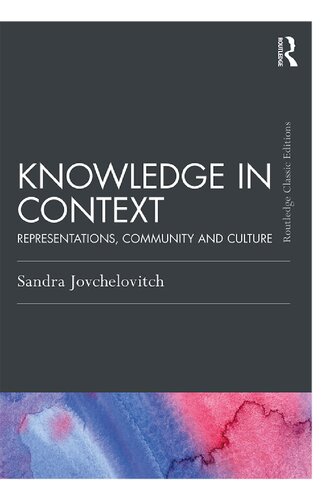

Most ebook files are in PDF format, so you can easily read them using various software such as Foxit Reader or directly on the Google Chrome browser.
Some ebook files are released by publishers in other formats such as .awz, .mobi, .epub, .fb2, etc. You may need to install specific software to read these formats on mobile/PC, such as Calibre.
Please read the tutorial at this link: https://ebookbell.com/faq
We offer FREE conversion to the popular formats you request; however, this may take some time. Therefore, right after payment, please email us, and we will try to provide the service as quickly as possible.
For some exceptional file formats or broken links (if any), please refrain from opening any disputes. Instead, email us first, and we will try to assist within a maximum of 6 hours.
EbookBell Team

4.1
100 reviewsIn this classic edition of her groundbreaking text Knowledge in Context, Sandra Jovchelovitch revisits her influential work on the societal and cultural processes that shape the development of representational processes in humans.
Through a novel analysis of processes of representation, and drawing on dialogues between psychology, sociology and anthropology, Jovchelovitch argues that representation, a social psychological construct relating Self, Other and Object-world, is at the basis of all knowledge. Exploring the dominant assumptions of western conceptions of knowledge and the quest for a unitary reason free from the ‘impurities’ of person, community and culture, Jovchelovitch recasts questions related to historical comparisons between the knowledge of adults and children, ‘civilised’ and ‘primitive’ peoples, scientists and lay communities and examines the ambivalence of classical theorists such as Piaget, Vygotsky, Freud, Durkheim and Lévy-Bruhl in addressing these issues.
Featuring a new introductory chapter, the author evaluates the last decade of research since Knowledge in Context first appeared and reassesses the social psychology of the contemporary public sphere, exploring how challenges to the dialogicality of representations reconfigure both community and selfhood in this early 21st century. This book will make essential reading for all those wanting to follow debates on knowledge and representation at the cutting edge of social, cultural and developmental psychology, sociology, anthropology, development and cultural studies.